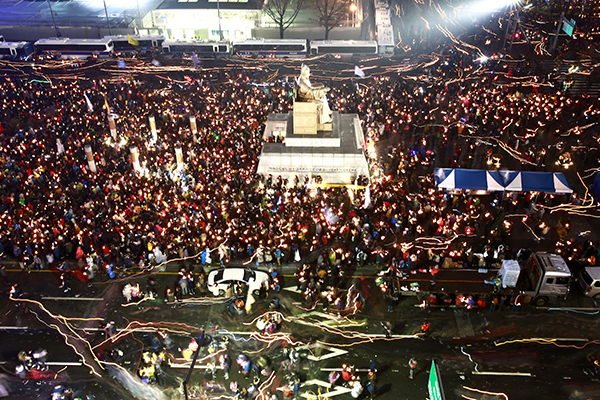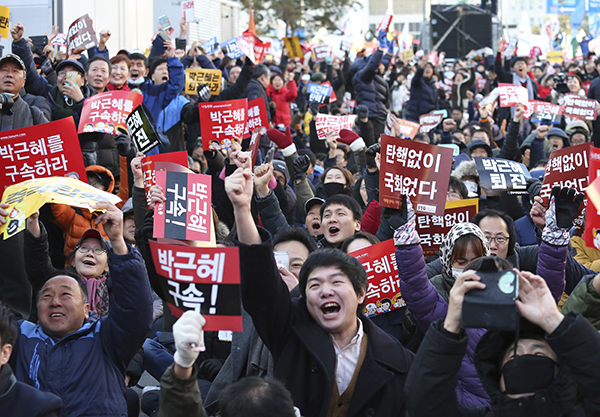Millions Demand South Korean President Step Down Immediately
December 19, 2016 | Revolution Newspaper | revcom.us

For the fifth straight weekend, masses of protesters occupy major avenues in downtown Seoul demanding the ouster of Park, November 26. (AP photo)

Protesters in front of the National Assembly, Seoul, Korea, celebrate after hearing of President Park Geun-hye's impeachment, December 9. (AP photo)
In 2012, Park Geun-hye was elected South Korea’s first woman president. Now, she is facing a major political crisis. In a country of 50 million people, there have been eight straight weeks of protests, some with as many as two million people, demanding her resignation. People in Park’s own party have turned against her. And on December 9, the parliament voted overwhelmingly to impeach her.
Park faces numerous counts of constitutional and criminal violations ranging from failure to protect people’s lives to bribery and abuse of power. A court now has up to 180 days to deliberate the motion to impeach. But the protests against Park have not stopped. The day after the vote, half a million people demonstrated, celebrating the vote but also saying they don’t want to wait for a court to rule on the impeachment and they want Park to face criminal charges. The crowd chanted, “Park Geun-hye, get out of the house!” and “Come down and go to jail!”
The current crisis was precipitated by a scandal involving Park’s friend, informal adviser, and spiritual guru, Choi Soon-sil. There are accusations that Choi had access to secret government documents, intervened in state affairs, and abused her relationship with the president to force companies to donate millions of dollars to foundations she runs. Choi has been detained, charged with abuse of power, extortion, and attempted fraud and, if found guilty, could get up to 15 years in prison.
The backdrop for people’s hatred and mistrust of Park is her family legacy. Her father, Park Chung-hee, seized power in a military coup in 1961 and ruled as a brutal president and military general until he was assassinated in 1979. In 1972, he declared martial law, ushering in a period of open dictatorial rule with intense police surveillance and a National Security Act that gave the government freedom to imprison anyone it considered “anti-government.” The Korean Central Intelligence Agency (KCIA), formed under the guidance of the U.S. CIA, was Park’s apparatus for domestic security. Park Chung-hee oversaw the massive growth of Chaebols (global multinational companies) like Samsung and Hyundai; and the further integration of South Korea into global imperialism—while social and economic inequalities, the denial of workers’ rights, and human rights abuses all rapidly grew.
Today, this legacy of exploitation and oppression is echoed to the point where, according to news reports, many, perhaps most of those demanding President Park’s resignation are deeply dissatisfied with the persistent, deep inequalities in society in things like education and employment—and people feel President Park has only reinforced these inequalities. And President Park has always defended her father’s dictatorship, only issuing, after she became president, some apologies for what he did. In her few years of rule, she has also instituted repressive measures—like a year ago when in response to massive protests against the Free Trade Agreement/globalization, she declared the demonstrations illegal and banned protesters from using masks to protect themselves against tear gas. One AP report wrote, “The political turmoil around Park comes after years of frustration over a leadership style that inspired comparisons to her father, slain military dictator Park Chung-hee. Critics saw in Park an unwillingness to tolerate dissent as her government cracked down on press freedom, pushed to dissolve a leftist party and allowed aggressive police suppression of anti-government protests....”
Earlier, a deal between Park and her own Saenuri party fell apart. Park agreed to resign in April 2017. But then, parliament leader Chung Jin-suk said public anger had forced the Saenuri party to withdraw this proposal, that it had become “realistically hard to maintain.” And this whole crisis has intensified intra-party divisions within the Saenuri party. In the impeachment vote, nearly half of the128 Saenuri lawmakers voted for impeachment.
Park has apologized for her relationship with Choi Soon-sil, but denies any wrongdoing, and there have been reports that Park has indicated she will not step down—leading many in the government to worry that the political crisis could drag on for months. And Park is fighting back. On December 16 her legal team formally submitted a rebuttal of the impeachment charges.
Park’s popularity is now hovering around five percent. But the efforts to impeach her have become a rallying point for her conservative supporters who staged their own protest of tens of thousands on December 17. There were reports of clashes between these pro-Park demonstrators and some in the anti-Park protest of 600,000 people across the street.
*****
In 2013, a year after Park was elected, a New York-based research company, Eurasia Group, ranked South Korea first in terms of political stability among 30 emerging countries. Perhaps then it was unthinkable that Park would not complete her term of office. But now, she is facing the possibility of impeachment or being forced to resign—which would be a historic precedent for South Korea.
If Park is removed from office, this may take the form of a conviction for corruption. But the dynamics of this are much more complicated, deep, and far reaching. Increasingly, the massive and determined and sustained nature of the protests has intersected with inter-ruling class contradictions, creating a situation where in the eyes of millions, Park has lost her legitimacy to rule. And more than this, the whole ruling class in South Korea is now facing great necessity, to try to deal with this crisis and prevent a legitimacy crisis that goes beyond Park. The upheaval in the streets has created a situation where not just those who have opposed Park, but even those who have supported her, cannot stand up for her without risking losing their own legitimacy.
The protests, in words and deeds, have expressed the stance that just because a regime is in power, it doesn’t have to stay in power—that just because someone is elected for a five-year term doesn’t mean they can’t be forced out before that. And right now this has created a situation where Park may go down.
Volunteers Needed... for revcom.us and Revolution
If you like this article, subscribe, donate to and sustain Revolution newspaper.
